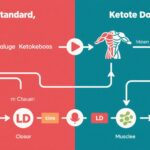Introduction
Patients suffering from sepsis often experience profound metabolic and immune system dysfunctions that can be exacerbated by conventional carbohydrate-rich nutritional support. In this context, ketogenic diets (KDs), characterized by low carbohydrate and high fat intake, have emerged as a potential immunometabolic intervention that might improve patient outcomes by modulating immune responses and providing alternative energy substrates.
The clinical evidence supporting KD use in critically ill sepsis patients remains limited. To address this gap, Rahmel and colleagues conducted a single-center, open-label, randomized controlled trial to evaluate whether KD could safely induce stable ketosis and influence clinical and immunological outcomes in this vulnerable population.
Study Design and Methods
The trial enrolled forty critically ill adult patients diagnosed with sepsis. Participants were randomly assigned to receive either a ketogenic diet or the standard high-carbohydrate diet typically used in intensive care units. The primary endpoint was achieving and maintaining stable ketosis, assessed by measuring blood levels of β-hydroxybutyrate (BHB). Secondary outcomes included feasibility and safety assessments, as well as exploratory analyses of clinical parameters and immune function.
Stable ketosis was defined by consistent elevation of BHB levels, indicating effective fat metabolism and ketone production. Clinical parameters such as insulin requirements, ventilation-free days, vasopressor-free days, dialysis-free days, and ICU-free days were recorded. Immune profiling involved next-generation sequencing of CD4+ and CD8+ T cells and measurement of cytokine secretion patterns to evaluate immune regulation.
Key Findings
All patients in the ketogenic diet group achieved stable ketosis, with a significant mean increase in β-hydroxybutyrate of 1.4 mmol/L compared to controls (95% confidence interval: 1.0 to 1.8; P < 0.001). Importantly, no major adverse events or harmful metabolic side effects such as acidosis, dysglycemia, or dyslipidemia were observed, confirming the safety of KD in this setting.
By day 4, none of the patients on the ketogenic diet required insulin therapy, whereas insulin dependency in the control group ranged from 35% to 60% (P = 0.009), indicating improved glycemic control with KD.
While 30-day survival rates did not differ significantly between groups, patients receiving the ketogenic diet experienced significantly more days free from mechanical ventilation (incidence rate ratio [IRR] 1.7; 95% CI: 1.5 to 2.1; P < 0.001), vasopressors (IRR 1.7; 95% CI: 1.5 to 2.0; P < 0.001), dialysis (IRR 1.5; 95% CI: 1.3 to 1.8; P < 0.001), and ICU stay (IRR 1.7; 95% CI: 1.4 to 2.1; P < 0.001).
Immunologically, next-generation sequencing revealed reduced dysregulation with decreased expression of T-cell activation and signaling genes in the ketogenic group. Additionally, pro-inflammatory cytokine secretion was significantly lower, suggesting that KD may modulate immune responses to reduce excessive inflammation.
Clinical Implications and Future Directions
This study establishes that a ketogenic diet can be safely implemented in critically ill sepsis patients to induce and maintain stable ketosis without inducing metabolic complications. The observed improvements in insulin independence and increased organ-support-free days suggest potential clinical benefits in sepsis management.
The immunological findings provide a mechanistic rationale for KD’s role in attenuating immune dysregulation, a hallmark of sepsis pathophysiology. Reduced T-cell activation and inflammatory cytokine production could translate into less organ damage and improved recovery.
However, as this was a single-center trial with a relatively small sample size, larger multicenter randomized controlled trials are warranted to confirm these findings and to evaluate the impact of KD on long-term survival and organ function in sepsis. Further research should also explore optimal KD formulations and timing of initiation in critical illness.
Conclusion
Rahmel et al.’s trial offers promising evidence supporting the feasibility, safety, and potential immunometabolic benefits of ketogenic diets in critically ill sepsis patients. By shifting the metabolic substrate from carbohydrates to fats, KD may mitigate the detrimental metabolic and immune dysfunctions characteristic of sepsis, ultimately improving clinical outcomes. These findings pave the way for expanded clinical trials and consideration of ketogenic nutrition strategies in critical care settings.
References
Rahmel T, Effinger D, Bracht T, Griep L, Koos B, Sitek B, Hübner M, Hirschberger S, Basten J, Timmesfeld N, Adamzik M, Kreth S. An open-label, randomized controlled trial to assess a ketogenic diet in critically ill patients with sepsis. Sci Transl Med. 2024 Jul 10;16(755):eadn9285. doi: 10.1126/scitranslmed.adn9285 IF: 14.6 Q1 . Epub 2024 Jul 10. PMID: 38985853 IF: 14.6 Q1 .


